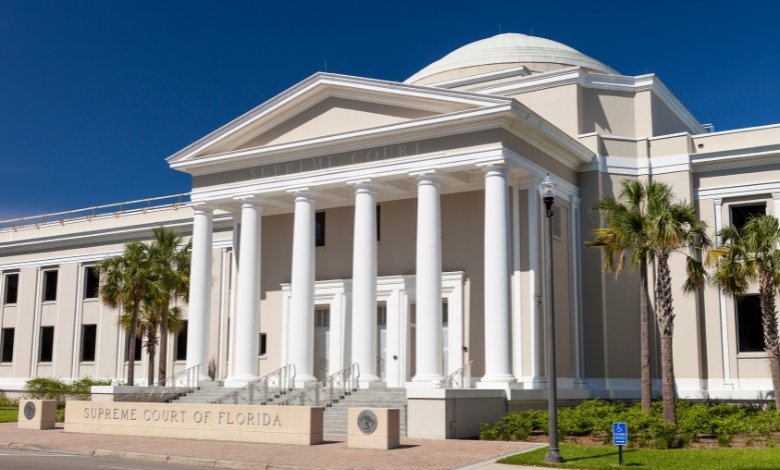Locate some of the most salient 2024 Florida banking law, rules, and regulations, key agencies, and how to maneuver effectively through a financial dispute.
Florida banking law can become a maze of policies, procedures, and regulations. Whether you are a banking professional, businessman, or just have an inquisitive mind about how financial systems work in the Sunshine State, it becomes extremely important to be knowledgeable about these laws.
In 2024, the landscape of Florida banking regulation will mirror a state-federal response, where two levels of regulation exist—one mandated by the individual states and the other statutory in nature, to be found in the legal quagmire presented by what is otherwise a splintered and somewhat confusing area. Below, we outline some important points of Florida banking law you’ll want to collect from an otherwise somewhat fractious and confusing legal landscape.
Table of Contents
My Journey into Florida Banking Law
Before getting into the weeds, let me share a bit about my journey. Moving to Florida a decade ago taught me that there are some very important local laws — and particularly those relating to finances. During my first budding days, I had no idea about how much the regulations might be different here than in my previous home state.
That is where I decided to plunge deep into Florida banking law, not for my good, but to help others also in treading this maze.
The first time I ever needed to see a banking law attorney, I remember it being an overwhelming experience. With the passage of time, I grasped how it all worked, and what initially appeared overwhelming became much more bearable since it became familiar. This article is the summary of that journey, trying to make as simple what initially came to me as confusing.
Understanding the role of the Financial Services Commission in 2024

One of the first things you’ll encounter when exploring Florida banking law is the Financial Services Commission. It is this commission that holds the key to the proper regulation of financial services in the state. By grasping its functions and responsibilities, one may well be on his way to comprehending the entirety of the landscape of regulation in Florida.
What is the Financial Services Commission?
The Financial Services Commission (FSC) is a regulatory body that oversees various aspects of Florida’s financial sector. It consists of four members: the Governor, the Attorney General, the Chief Financial Officer, and the Commissioner of Agriculture. Each member has a distinct role in shaping financial policies and regulations.
Key Responsibilities
Why It’s Important
Anyone dealing with the financial world in Florida really should understand the role of the FSC. Whether you are working in banking or using one of its many services as a customer, the regulations enforced by the FSC affect you directly. This can save time and money when you know whom to go to for help or whom to call for a problem.
What the Florida Office of Financial Regulation Does: Important Functions and Services
Another critical player in Florida’s financial landscape is the Florida Office of Financial Regulation (OFR). This office is more hands-on with day-to-day regulatory activities and works closely with the FSC to enforce financial regulations.
What services are offered by the Florida Office of Financial Regulation?
The Florida Office of Financial Regulation charters, licenses, and regulates a wide range of state financial institutions and professions within the state. These range from banks and credit unions to mortgage brokers and even payday lenders.
Major Functions of the OFR
Why It Matters
The OFR is your one-stop shop for all issues related to financial regulation. If you are a financial professional, you’ll want to stay on the good side of the OFR to keep your license intact with no penalties. For the consumer, the OFR is an ally in usually cloudy financial services.
How to Choose the Appropriate Banking Lawyer for Financial Disputes

Now let’s address something nobody ever talks about until it’s too late: finding the right banking lawyer. Whether you are a business person or an individual, financial disagreement can at times see you find yourself in court. If the worst comes to the worst, a good lawyer can make all the difference.
Reasons You Would Want a Banking Lawyer
I still remember my first banking dispute, which involved a mortgage lender, and was quite beyond my capacity. After some searching and referrals, I located a banking lawyer with particular skill and knowledge in handling such matters. That taught me the importance of proper legal representation when it came to issues of a financial nature.
What to Look for in a Banking Lawyer
Why It Matters
However, with very high stakes, the most critical aspect is usually in choosing the right banking lawyer: the difference between winning and losing a financial dispute. The stakes are high, yet peace of mind and protection will reign with this professional legal advice regarding your financial interests.
Overview of Responsibilities of the Florida Department of Financial Services
The Florida Department of Financial Services, or DFS, is the largest single participant in terms of financial regulation within the state. This department’s sphere of responsibility includes everything from insurance to overseeing the state treasury.
What is the Florida Department of Financial Services, and what does it do?
The Florida Department of Financial Services is a multifaceted agency with responsibilities spanning several areas of financial regulation. It’s headed by the state’s Chief Financial Officer (CFO), who is also a member of the Financial Services Commission.
Key Responsibilities
Why It Matters
Whether you recognize it or not, the DFS is tasked with many roles in everyday life in Florida, from knowing its role to understanding how one can better deal with various financial and insurance issues. Be it for an insurance claim or an understanding of how funds from the state coffers are managed, the DFS sure comes in handy in one way or the other.
Florida Department of Financial Regulations: An Overview

This would be followed by the broader framework of Florida financial regulations, which are broader sets of rules and guidelines that would generally govern every activities, from banking to securities trading, involving monetary flows in the state.
What are the financial regulations in Florida?
Florida financial regulations are guidelines and laws that are designed to promote stability and integrity in the state’s financial system. They emanate from a wide range of activities that include banking, insurance, and securities, among many others.
Key Elements of Florida Financial Regulations
Why it Matters
Understanding Florida’s financial regulations is quite important for a banker, lawyer, or consumer; these are the guiding laws inasmuch as these norms govern the sector and how to relate with any other financial institution or service.
Florida Banking Commission: Know it Well
No discussion of the Florida banking law would be complete without the Florida Banking Commission, which plays a vital role in the regulation of the state’s banking industry.
What does the Florida Banking Commission do?
The Florida Banking Commission is the agency in charge of regulating and supervising the state banking system. It collaborates with the Florida Office of Financial Regulation for the banks to operate within the limits of the state laws.
Key duties
Why It Matters
By demystifying the role of the Florida Banking Commission, it can help place you at ease concerning a lot of the aforementioned complexities of Florida banking law.
Department of Banking Florida: A Closer Look
Lastly, let’s check at the Department of Banking Florida also commonly known as FL Dept of Banking and Finance. The FL Banking and Finance is a division of the Florida Office of Financial Regulation regulating the banking activities of this state.
What is the Florida Department of Banking?
The Florida Department of Banking regulates various activities in the banking sector of the state. This involves the inspection of banks, credit unions, and other institutions involved in financial activities operating in the State of Florida.
Key Responsibilities
Why it matters
For any person who may be dealing in the banking circles of the state, understanding what the Department of Banking Florida does is important. For instance, both a banker and a consumer in this state will know who to approach in case complaints should arise, or for guidance, hence saving pretty much a lot in both time and money.
FAQs
1. What does the Florida Office of Financial Regulation do?
The agency responsible for the licensure of and regulation over the institutions which are operating in Florida, including but not limited to banks, credit unions, and certain non-depository financial service providers, is the Florida Office of Financial Regulation. The OFR conducts licensing and examination activities as well as enforcement of state laws relating to safety and soundness concerns and to protect the consumers from fraudulent business practices.
2. How does the Financial Services Commission (FSC) influence banking regulations in Florida?
The Financial Services Commission (FSC) in Florida is a key regulatory body that oversees the state’s financial services industry. Comprised of the Governor, Attorney General, Chief Financial Officer, and Commissioner of Agriculture, the FSC is responsible for developing and enforcing policies related to banking, securities, and insurance. The FSC works closely with the OFR to ensure that financial institutions comply with state laws and regulations.
3. What should I take into account when hiring a banking lawyer in Florida?
In searching for a banking lawyer in Florida, consider the lawyer’s specialty in banking law, experience in handling similar cases, reputation in the legal community, and how well they can communicate their ideas. A good banking lawyer should possess enough knowledge about Florida’s financial regulations to represent your interest in disputes or regulatory matters effectively.
4. What are the major functions of the Florida Department of Financial Services (DFS)?
The Florida Department of Financial Services (DFS) is responsible for a wide range of functions, including regulating the insurance industry, managing the state treasury, overseeing fire safety, and protecting consumers from financial fraud. The DFS also plays a crucial role in ensuring that financial institutions operate in compliance with state laws and regulations, contributing to the overall stability and integrity of Florida’s financial system.
Conclusion: Navigating Florida Banking Law
Maneuvering through the banking laws of Florida may be quite daunting; however, it is of indispensable importance for any forward-thinking individual or those already in the state’s financial business. From the Financial Services Commission to the Florida Office of Financial Regulation, the multiple regulatory bodies and laws overseeing the operations of banks and other financial institutions in Florida are beyond enumeration.
So, learning about the functions and responsibilities of these entities will not only help an individual better navigate the financial landscape in Florida but also greatly allow a consumer to assess which financial institution is best for him. Proper knowledge of Florida banking law is essential for a banking professional as well as a consumer, or any individual who is interested in understanding the functioning of the financial domain.
If you are in the middle of a financial dispute, it would be wise to go and see a qualified banking law attorney. They might turn out to be really helpful in the complexities of Florida’s financial regulations. And remember—knowledge and being on the move are the best policy for safeguarding your financial interests in 2024 and any year thereafter.


